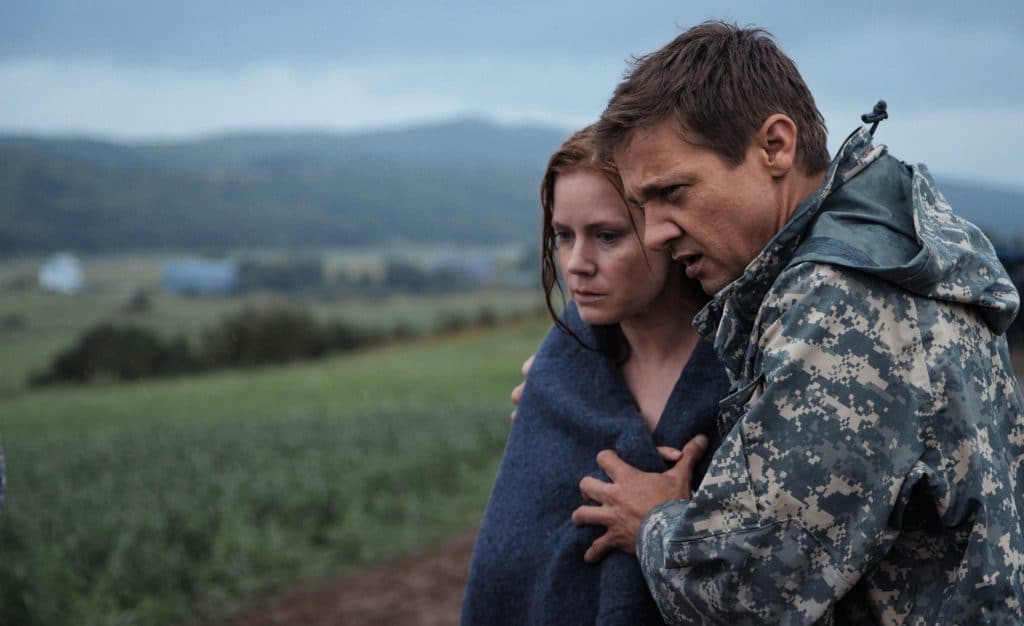Like all great science fiction, Denis Villeneuve’s masterpiece Arrival is a profound philosophical exploration of what makes us humans
Arrival (2016)
Directed by Denis Villeneuve. Screenplay by Eric Heisserer, based on “Story of Your Life” by Ted Chiang. Starring Amy Adams, Jeremy Renner, Forest Whitaker, Michael Stuhlbarg, Mark O’Brien, Tzi Ma, Abigail Pniowsky, Julia Scarlett Dan and Jadyn Malone.
At a certain moment in Denis Villeneuve’s sci-fi masterpiece Arrival, linguist Louise Banks, played by Amy Adams, says to physicist Ian Donnelly (Jeremy Renner) that she feels that everything they are experiencing comes down to the two of them. Aliens are making contact with Earth in gigantic, semi-oval extraterrestrial vessels that float over twelve seemingly arbitrary sites around the globe, but there are times when it takes a major large-scale event to help us realize that the most surprising is right next to us. Arrival is a special film about special encounters, and a profound philosophical exploration of the human condition that makes us reflect on the beauty of communication, memory and love.
Adapted by Eric Heisserer from Ted Chiang’s short story Story of Your Life, Arrival begins right away with a heartbreaking sequence comparable to the first ten minutes of Up (2009), in the sense that it should bring you to tears before a premise is even established. With a beautiful score and bluish cinematography, it already shapes the film’s thematic core as Louise narrates this story of beginnings and endings and we see her losing her daughter Hannah to cancer. Then we jump to the present, when the aliens arrive on Earth and Louise is asked by U.S. Army Colonel GT Weber (Forest Whitaker) to join a team of specialists to find out if they have come in peace or are a threat. As tension and fear begin to escalate into riots all over the world, Louise must race against time to find a way to communicate with the aliens before a global war erupts.
The most important questions to which she must find answers are: What is their purpose on Earth? Why twelve vessels and not just one? And why those specific locations? What do they have in common? Right from the moment when the aliens make contact, Villeneuve builds a strong sense of mystery. Louise’s students don’t show up in class anymore, U.S. military aircrafts are seen bursting through the sky at full speed, triggering our instant fear that something must be very wrong, and Louise is visited by military officers who need her to translate strange guttural sounds from some unknown source. Villeneuve directs these scenes without hurry, stretching the tension and keeping us in a constant state of apprehension.
The framing and camera movements also contribute to enhance that feeling. Take, for instance, the long scene of the first encounter. It is long enough to leave us on the edge of our seats, and Villeneuve plays with our sense of perspective. The team can walk along the sides of the alien vessel, and at one moment he even stretches the length of the corridor that leads to a large rectangular glass. There is a crucial wait as they walk towards the glass, the score using three notes that repeat over and over, eliciting a powerful feeling of anxiety. We see fog on the other side, and at one moment the camera tilts up from above the characters (who are seen upside down) to the glass — whereas a few times earlier, it tilted down from ceilings to windows when the characters were right-side up on Earth. Again, it’s all about perspective.
Gravity is relative, up can be down and all this brings us to one of the most important matters under discussion: communication. First of all, how can you communicate with an alien race without a starting point? And how can you make sure they understand what you are trying to say? Words can have different meanings, and Louise knows that language was seen in the past as an expression of art. Amy Adams, by the way, does a fantastic job in making us believe that her character is a highly qualified linguist with a great understanding of the complexity of language, like when she gives Weber a more precise meaning for a rare Sanskrit word or uses the word “kangaroo” as an example of miscommunication. But even more interesting is how she and Donnelly baptize the aliens as “Abbott” and “Costello,” a reference to the duo’s comedy bit Who’s on first?, which was all about misunderstanding.
And if I mention Louise and perspective, the fact is that her perspective is at the center of the narrative, since we follow everything from her point of view. When she is flying to Montana aboard a U.S. aircraft, we are only able to hear what Donnelly is saying over the loud engine noise when she puts on her headphones; and when the aircraft approaches the vessel, we see it from an aerial shot (that is, Louise’s eye level). Subjective sounds and images are accompanied by dissonant noises that seem to reflect her feelings about what she is looking at. We share her apprehension and later fascination with an unknown non-linear language, and when she decides to differentiate (or individualize) herself (“Louise”) from the whole (“human”), removing her Hazmat suit and approaching the aliens, the camera also moves closer to one of them and lets us see more of their bodies too.
When Louise begins to dream in their language and have sudden flashes of memories, the camera starts to move in an edgier way, going in and out of focus and showing us visually her disorientation — and the use of shallow focus and muffled sounds when she is around other people emphasizes her disconnection from them. She hears sounds that are not there and intrusive memories insist on invading her thoughts to the point that she doesn’t seem to be that psychologically fit anymore to continue her work. Anyone who suffers from attention deficit or tends to daydream will find it easy to relate to that, and the wonderful editing mixes reality with those confusing flashes in an effective way — first timidly but later more intensely.
To answer its philosophical questions, Arrival embraces the Sapir-Whorf hypothesis, that is, the idea that language determines or affects thought. But it goes even farther in its ambitions by also suggesting that humanity is perhaps not ready yet to face the unknown (the Mahjong strategy shows that). Reporters on TV quickly twist a sentence like “offer weapon” into “use weapon” without caring about the radical change in meaning or the dangerous implications of that. And if we think very carefully about the importance of cooperation between those twelve countries, it should make a whole lot of sense that the aliens would pick nations such as Russia, China, Venezuela and Sudan to teach a lesson on union, tolerance, trust and peace.
With a beautiful score by Jóhann Jóhannsson that makes an impeccable link between the first and last scenes using Max Richter’s melancholy On the Nature of Daylight, Arrival reiterates its main themes about time, compromise, love and what makes us embrace life even knowing how and where the road leads. Perhaps a more appropriate title should have been “Hannah.” In any case, there is so much that this film proposes in terms of philosophical and existentialist ideas that it would take a lot of articles to discuss the implications of everything it says. And that, of course, is the best type of science fiction there is.





